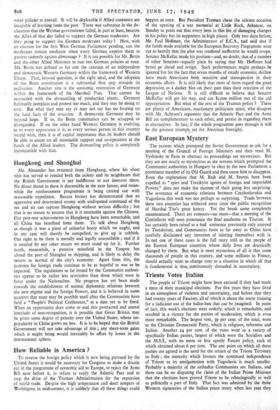East European Mystery
The reasons which prompted the Soviet Government to ask for a meeting of the Council of Foreign Ministers and then send M. Vyshinsky to Paris to obstruct its proceedings are mysterious. But they are not nearly so mysterious as the reasons Which prompted the Communist authorities in Hungary to elect to the new Parliament a prominent member of its Old Guard and then cause him to disappear. Even the explanation that M. Rajk and M. Szonyi have been expelled as " spies and Trotskyist agents of foreign and imperialist Powers" does not make the manner of their going less surprising. The severance of economic relations between Czechoslovakia and Yugoslavia this week was not perhaps so surprising. Trade, between these two countries has withered away since the public recognition of Marshal Tito's great heresy. Yet the break came completely unannounced. There are rumours—no more—that a meeting of the Cominform will soon pronounce the final anathema on Titoism. It has certainly been raised to a bad eminence previously only enjoyed by Trotskyism, and Communists from as far away as China have carefully disclaimed any intention of tainting themselves with it. In not one of these cases is the full story told to the people of the Eastern European countries whose daily lives are drastically changed by them. But what is most mysterious of all is that some thousands of people in this country, and some millions in France, should actually want to change over to a situation in which all that is fundamental is thus; continuously shrouded in uncertainty.






































 Previous page
Previous page